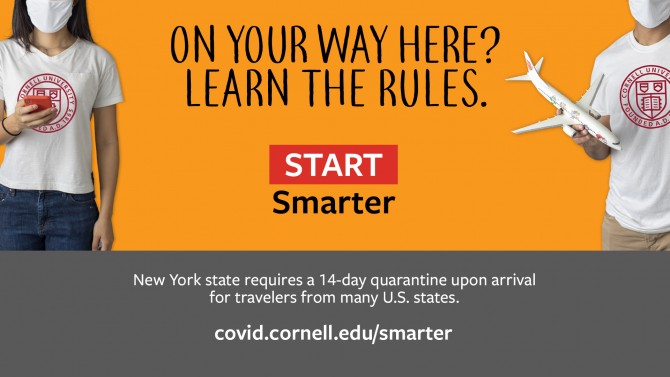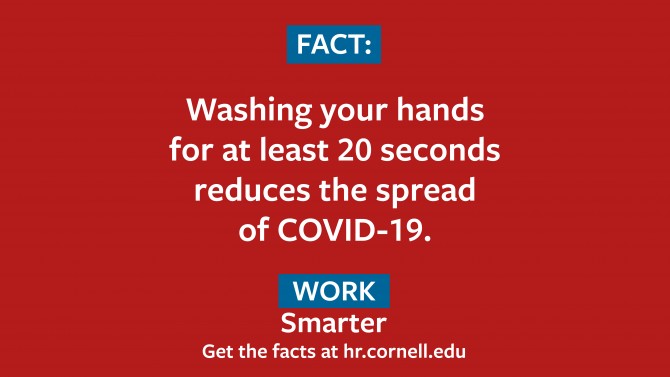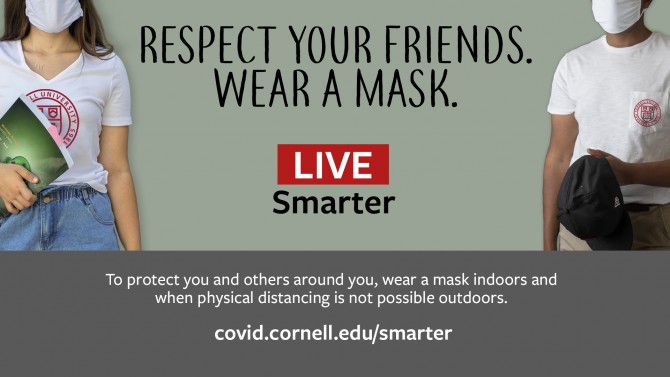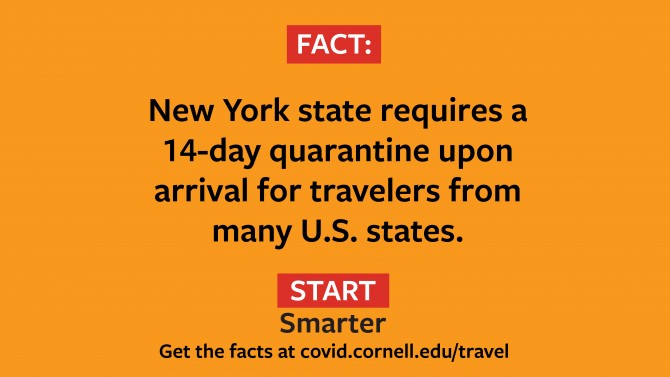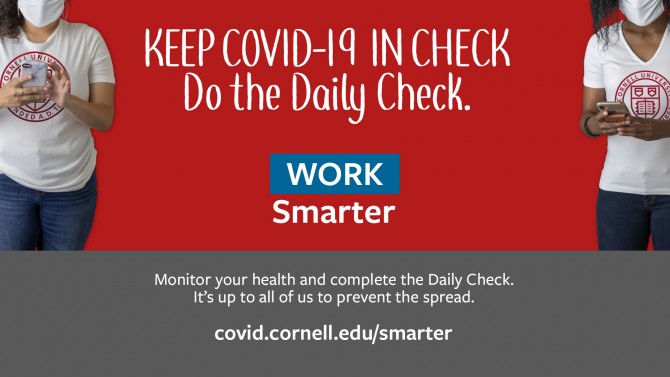
Cornell launches public health campaign
By James Dean
Ahead of students’ return to Ithaca this month, Cornell has launched a robust public health campaign that asks every member of the community to do their part to limit spread of COVID-19, on and off campus.
Through social media feeds, inboxes, signage blanketing campus and nudges from fellow Cornellians, the campaign will reinforce early and often the need for students, faculty and staff to adhere to essential protective behaviors including wearing face coverings, physical distancing and good hand hygiene.
“It’s critical that we as a community do all we can to create an environment that does not create added risk for the more vulnerable among us,” said Timothy C. Marchell ’82, director of the Skorton Center for Health Initiatives at Cornell Health. “The public health campaign sets the stage for that shared effort by communicating expectations, increasing knowledge and calling upon everyone in the Cornell community to do the right thing during this global pandemic.”
The campaign’s call to action is part of fall reactivation plans President Martha E. Pollack announced June 30, which will implement a mandatory coronavirus testing program and require all returning students to abide by new behavioral guidelines, or else face sanctions.
The campaign’s behavioral guidance is based on scientific research and best practices known to date, Marchell said. It also includes reminders to get tested, stay home when sick and complete the Daily Check, an online assessment of health symptoms and other risk factors required for students, faculty and staff approved to study or work on campus.
The messages present public health tips and facts to help convey the “why behind the what,” Marchell said, while emphasizing shared responsibility.
“Respect Your Friends. Wear a Mask” reads one campaign asset featuring a picture of two masked Cornell students. “To protect you and others around you,” the copy continues, “wear a mask indoors and when physical distancing is not possible outdoors.”
The tag line “Live Smarter” is one of the campaign’s five organizing themes, along with Dine, Study, Work and Start Smarter. The latter refers to actions students should take before traveling to Ithaca, such as completing a re-entry checklist.
Another campaign message, “Stay Apart. Keep in Touch,” encourages physical distancing of at least six feet and greeting others without physical contact. “Keep COVID-19 in Check. Do the Daily Check” notes that “it’s up to all of us to prevent the spread.”
Complementing the campaign is a collection of red-and-white informational signs and graphics – available for download here – that will be visible at building entrances and in classrooms, dining halls, bathrooms and kitchens, as well as on digital signage and at campus entry points, information booths and maps. One poster suggests how to gauge proper physical distancing: the width of an average sedan, four chairs or one Big Red bear.
Moving forward, the campaign is expected to feature messages from local leaders; broadcast public service announcements; and paid advertising that extends the messages’ reach into the community and the local businesses where students may gather this fall.
“So far our community has done a great job of following public health guidance and acting responsibly to prevent the spread of COVID-19 here in Tompkins County,” said Frank Kruppa, Tompkins County public health director. “It’s important that as we have more people returning to our community, that this guidance continues to be followed closely. Stopping the spread is on all of us. I encourage folks to pay close attention to the messaging and consider each of our roles in keeping the community healthy.
“Cornell has been a great partner throughout this whole pandemic response,” he said, “and we look forward to continuing to work together on coordinated communications plans.”
In addition to the Skorton Center, university departments contributing to the public health campaign include Environment Health and Safety, Human Resources and University Relations.
On and off campus, the campaign will be supported by a team of student volunteers who will help model behavioral guidelines and be peer advocates for setting positive norms and behaviors through the COVID-19 Student Peer Health Ambassador Program, advised by the Division of Student and Campus Life.
Trained peer ambassadors, including leaders from student organizations, athletic teams and Greek life, will promote awareness of the guidelines, potentially including handing out masks and hand sanitizer. They’ll also meet regularly to discuss challenges and strategies for promoting best practices among their respective social networks, teams or organizations.
“Students listen to and respect each other, and they know what’s going on in the culture,” said Jenny Loeffelman, assistant vice president for student and campus life. “The goal is for them to influence student groups to do the right thing and let it become the norm. We’re excited that students have stepped up and said they want to do this.”
Embracing new behavioral norms is essential with so much at stake, Marchell said – the health and safety of the Cornell and local communities, above all, but also the university’s ability to provide high-quality instruction, conduct research and foster a sense of belonging outside the classroom.
“A public health campaign alone cannot protect our community from COVID-19, but it plays an important role – along with other key strategies like testing, quarantine, enforcement and policy – in reducing risks within our community,” Marchell said. “Our hope is that this shared information will help us to move forward together as we reactivate the campus.”
Media Contact
Get Cornell news delivered right to your inbox.
Subscribe